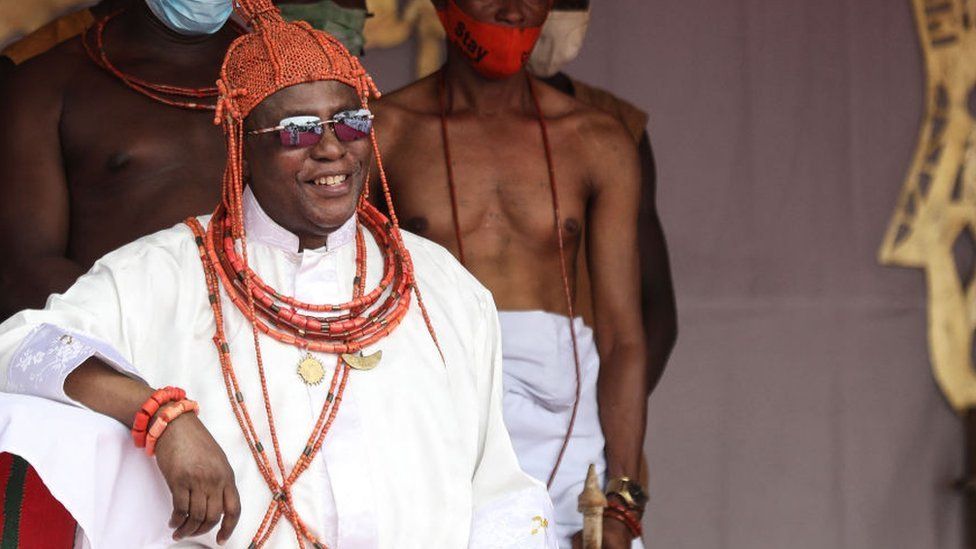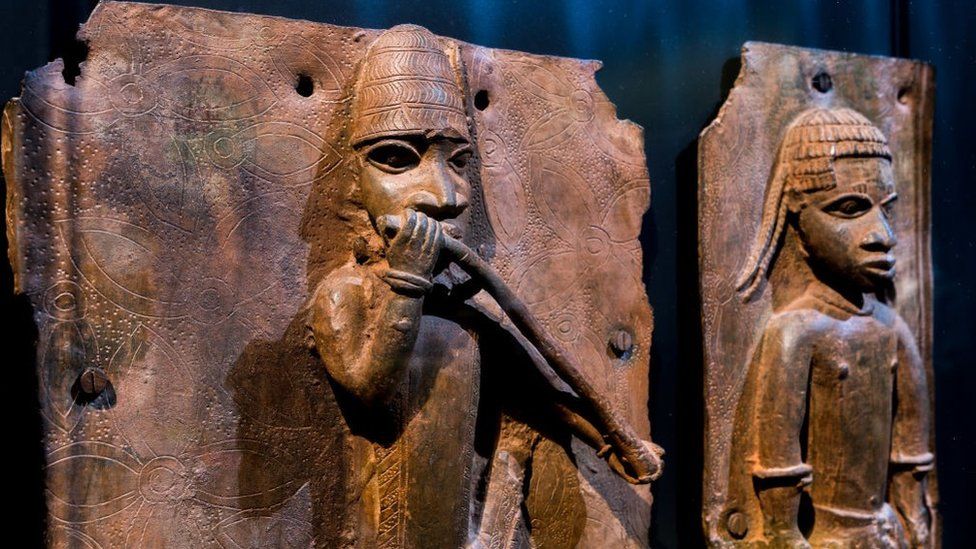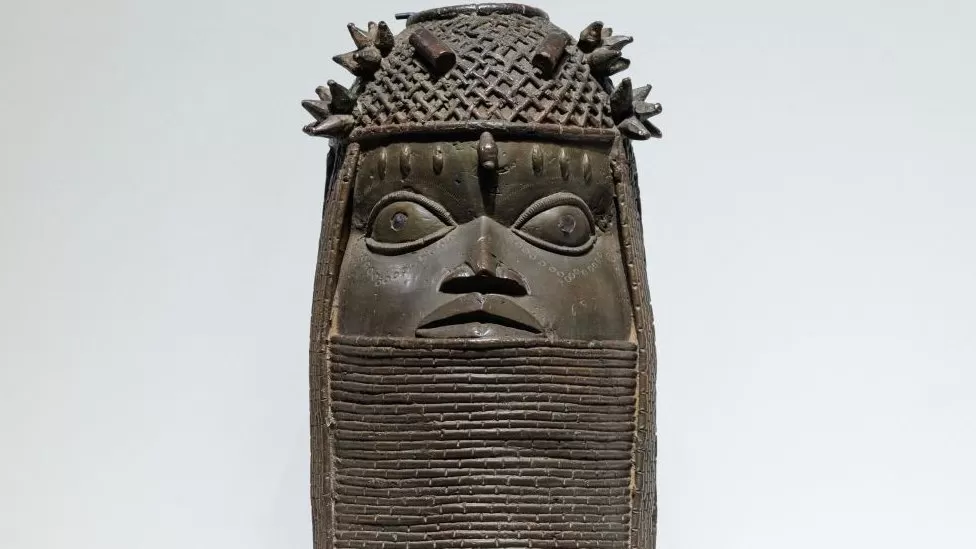Nigeria’s outgoing president has issued a declaration over the Benin Bronzes that could have significant consequences in the campaign for the return of these great cultural treasures, as Barnaby Phillips has been finding out.
In the dying weeks of his administration, Nigeria’s President Muhammadu Buhari made a decision which has caused a mixture of delight, concern and confusion.
His declaration of 23 March, made public last month, unequivocally recognises the Oba, or king, of Benin, Ewuare II, as the owner of the famous Benin Bronzes.
These are thousands of metal castings and ivory carvings which were looted by a British military expedition in 1897 from the Benin kingdom in what is today southern Nigeria, and are now mainly in museums in Europe and the United States.
In recent years several of these museums, responding to demands from Nigeria but also from within their own societies, have started to return the Bronzes.
The Nigerian president’s declaration says any repatriated Bronzes must be “handed over to the Oba”, who is “responsible for the management of all places” where they will be kept.
This could include the Oba’s palace, or anywhere else he and Nigeria’s government consider secure.
No Benin Bronze can be moved without the Oba’s written authority, and he must inspect and authenticate each one upon its subsequent return.

In other words, Ewuare II has been given sweeping powers.
These appear to come at the expense of the Nigerian government’s National Commission for Museums and Monuments, (NCMM), which has handled many of the negotiations over the return of colonial-looted artefacts.
When the Oba played host to the Dutch ambassador in his palace in Benin City last month, he spoke confidently.
The president, said the Oba, had “spelt it out clearly. The ownership, custody, and management are vested in the Oba as an institution. That is the law.”
Many of the Benin people, known as the Edo, welcome the president’s declaration.
The Benin Bronzes became known internationally as works of art during the decades they have been in Western museums, but they have a spiritual significance which predates this.
They were made by royal guilds, to venerate the Oba’s ancestors, and were kept in the palace.
Ewuare II is the great-great grandson of the Oba toppled by the British, and his palace was built upon the ruins of the one destroyed in the invasion.
But for the NCMM, supposedly in charge of the country’s heritage and yet not even mentioned in the president’s declaration, this has come as an unwelcome surprise.
“We were blindsided… this is not practical nor compatible with existing Nigerian law [and] it was written by someone who doesn’t understand how museums work,” one official said.
I am told the NCMM has been invited by Nigeria’s ministry of justice to offer amendments to the president’s declaration.
But President Buhari may feel this is a problem best left to his successor, President-elect Bola Tinubu, due to be sworn in on 29 May.
Nigeria’s contradictions and fragilities – its many ethnic groups were carelessly thrown together by the British in 1914 – are never far from the surface.
One of the NCMM’s concerns is that President Buhari has, inadvertently, undermined the rationale for any national collection.
If the Oba’s ownership of the Bronzes moves beyond the theoretical to the practical, does this not mean that every Nigerian traditional ruler or community is in charge of the treasures made by their ancestors?
The NCMM aims to build a Museum of National Unity in the capital, Abuja, which would, presumably, contain objects such as the Benin Bronzes. That ambition could be harder to achieve now.
Oba Ewuare II and his advisers are more focused on local politics.
They welcome the president’s declaration as a victory over the governor of Edo State, Godwin Obaseki, with whom they have a chilly relationship.
Governor Obaseki supports a museum project in Benin City known as the Edo Museum of West African Art, or EMOWAA, which has attracted international funding and engaged the Anglo-Ghanaian architect Sir David Adjaye.

EMOWAA says it will complete its first building in 2024.
Although it has abandoned its original ambition to be “home to the world’s most comprehensive collection of Benin Bronzes”, it is still viewed with suspicion by palace officials.
The Oba says that returned Benin Bronzes will eventually go on display in a much discussed Benin Royal Museum, to be located near his palace and constructed with the support of the Nigerian government.
“All hands are on deck” for this museum, according to the Oba.
European museums, perhaps understandably, are confused.
The German government, which has taken the lead on the return of Benin Bronzes, says these are internal matters for Nigeria. But some diplomats are worried.
“We negotiated with the Nigerian government to return Bronzes to the NCMM, and signed contracts with the NCMM,” says a key German official, “so who are we giving them to?”
In November 2022 Germany’s Foreign Minister Annalena Baerbock flew to Abuja and, amid fanfare, delivered some 20 Bronzes to Nigeria’s minister of culture. They remain in NCMM custody.
“Things would be done differently next time,” one of the Oba’s officials said.
A close relative of the Oba told me the NCMM had “bungled” returns by “surreptitiously” signing agreements.
But he and NCMM officials also told me they were determined to resolve simmering tensions and work together.
“We shouldn’t take the presidential declaration too literally,” he said, “but as an acknowledgement that the Oba must be at the heart of the process.”
In Britain, museums also try to navigate their way through Nigerian politics.
Cambridge University’s Museum of Archaeology and Anthropology was due to hand over 116 Benin Bronzes to a Nigerian delegation on 16 May.
It would have been a highly symbolic moment.
Cambridge has the second biggest collection of Benin Bronzes in Britain after the British Museum itself, which is increasingly isolated on the issue of restitution.
But Cambridge’s event has been quietly postponed.
“There being a bit of confusion, it seemed better to pause,” explained one official, diplomatically. October is mooted as a new date.
“I have no doubt,” emphasised the museum’s director, Nicholas Thomas, “that the transfer of ownership will go ahead.”
